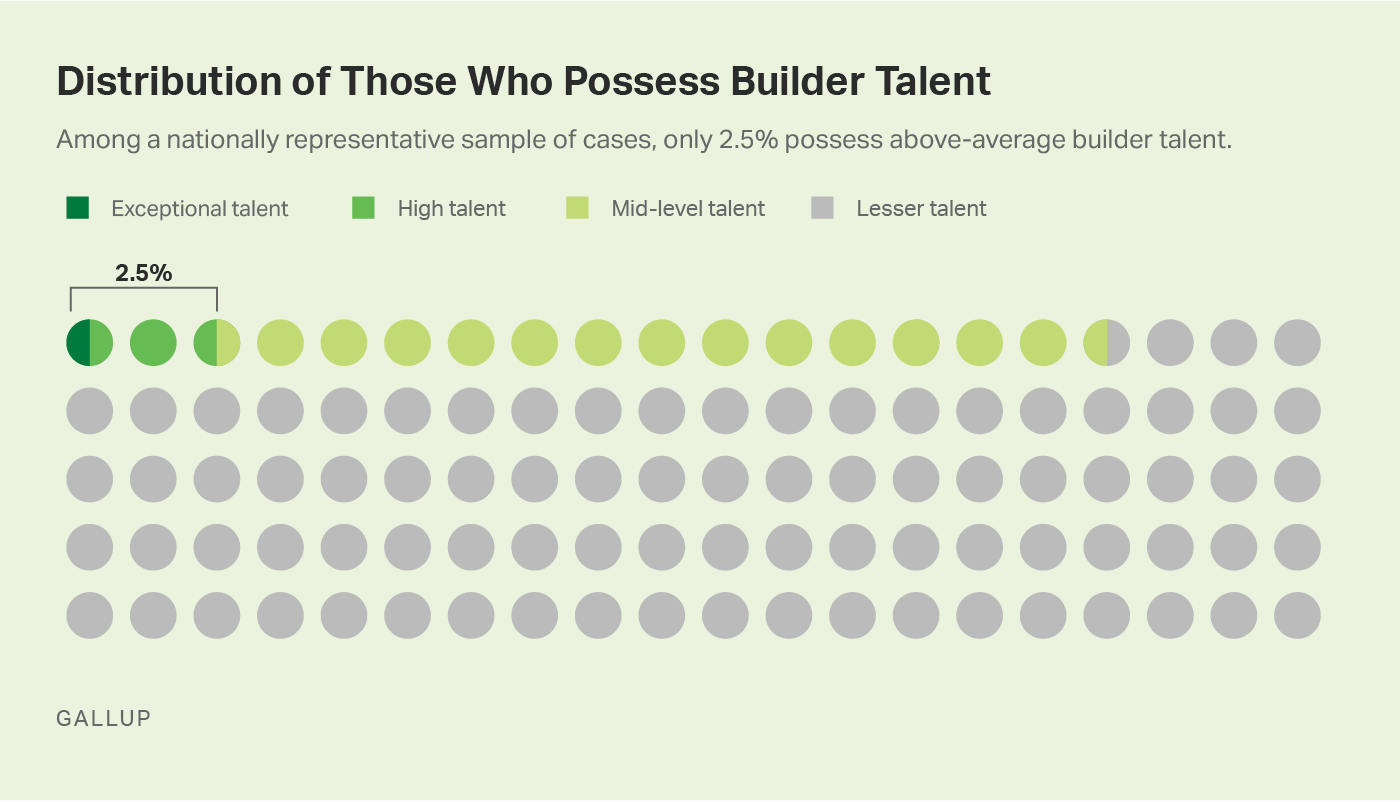Story Highlights
- Commoditization in the professional services industry requires a differentiated approach
- Gallup scientists have discovered the new talent combination that will drive differentiation
Gallup has discovered the key talents necessary to differentiate professional services organizations in today's hypercompetitive and disruptive landscape.
Every day, technology makes it easier and easier to access information and expertise. This commoditization of business assets leaves professional services firms with an existential dilemma: how to differentiate to retain and grow business.
The answer to outsmarting commoditization requires a complete customer-centric culture change that starts with talent -- the innate human abilities that cannot be taught. Employees with the right combination of natural abilities can push business relationships through disruption and help their firms achieve new competitive advantages.
To find employees with the ideal talent makeup, leaders first must understand how the demands on employees are changing. Gallup's research and consulting experience show that the following three trends are creating different job requirements for success:
-
Data proliferation: It's no surprise that employees need digital prowess to succeed in the future of work -- an understanding of technology's capabilities, limitations and potential developments. But the best workers are more than tech savvy; to truly differentiate, they must be pseudo-data scientists who consider how technology complements their human expertise. They can't be lost in the mounds of big data; rather, they need to quickly make sense of information, see the relationships within it and harness it for a competitive business advantage.
-
Rapid change: Digital transformation creates the need for agile learning. The risk of obsolescence is ongoing in the future of work, which means employees must acquire niche specialization and targeted expertise. Modern employees need to be comfortable quickly identifying and acquiring new skills. When new technologies arise, the most talented employees determine how those advancements can liberate them to better serve customers. They keep up with digital trends; consider how technology can create new possibilities in their role; and reposition themselves to add optimal, innovative value to the customer.
-
Interconnected business problems: Technology is bridging the gaps in organizational structures, creating a demand for holistic business solutions. In this new reality, successful professionals are advisers and comprehensive business problem solvers. They are skilled relationship builders who discover (and solve) customers' biggest business problems to foster meaningful, lasting connections with customers. The best employees identify and predict customers' biggest needs (with the help of leading analytics) and offer tailored solutions. They take personal ownership of customers' challenges and hold themselves accountable to measurable business improvements.
The Right Talents Are Hard to Find
Only certain individuals possess the right talents to tackle these new job requirements with excellence. Gallup refers to these unique individuals as consultative builders.
By nature, consultative builders follow a customer-centric business growth strategy. That is, they recognize that identifying and solving customers' business problems is the secret to expanding business, not simply fulfilling customers' requests. Consequently, they develop trusting relationships to deliver customized, data-driven solutions.
Employees with the right combination of natural abilities can push business relationships through disruption and help their firms achieve new competitive advantages.
Consultative builders have a knack for driving business outcomes. Gallup analytics show that individuals with innate builder talent, compared with less talented employees, are:
- 4x more likely to exceed profit goals
- 5x more likely to exceed sales goals
This talent makeup is rare: Only 2.5% of candidates have above-average builder talent.

Here's the Good News
Leaders can find the talent needle in the haystack if they invest in proven selection and attraction methods.
To start, leaders need the right talent assessment -- one that relies on objectively defined talent profiles. Gallup analytics show that leaders who use these scientifically validated assessments are 20% more likely to hire exceptional candidates.
The best talent assessments reveal whether candidates have specific, nontrainable characteristics that are difficult to spot in traditional (often biased) behavioral interviews.
Leaders need a talent assessment that determines whether candidates are natural consultative builders -- that is, whether candidates will thrive in the aforementioned job demands required today and in the future.
With over 1.5 million profiles assessed, Gallup has uncovered the seven nontrainable talents that differentiate consultative builder talent. These seven talents are not the only ones that individuals need, but they are the differentiating talents for those individuals who have what it takes to excel as agile data scientists -- those who address business challenges and lead with excellence.
- Courage: Are they willing to take strategic risks to achieve new heights of success?
- Persuasion: Do they seek others' input and use a mutually participative process to guide others' thinking?
- Communicative Approach: Do they encourage dialogue, understanding and consensus to foster meaningful relationships?
- Business Thinking: Do they analyze opportunities in terms of business potential and find solutions with the greatest potential returns?
- Competency Drive: Are they highly motivated to learn because of their drive to provide clients with expert advice, knowledge and service?
- Service Orientation: Do they thrive when asked to help because it signifies a client's trust in their partnership?
- Problem Solver: Do they enjoy solving puzzles -- and use that ability to fully understand each client's unique circumstances and deliver perfect solutions?
Leaders who want to find candidates with consultative builder talent should ask themselves the following questions:
- Have we clearly defined a validated talent profile for the future talent of professional services?
- Does our current talent assessment process measure innate talent, or merely knowledge and skills on a resume?
- How well do our current interview questions gauge innate consultative builder talent?
- Does our employer brand attract the type of talent we're looking for?
Like it or not, the future of work is here. For leaders, this means the time to start intentionally and scientifically attracting and hiring consultative builders is yesterday.
Bring on people who grow your business, even during disruption:
- Learn how Gallup can help you pick the best of the best.
- Read how to keep top talent with your purpose, brand and culture.
- Watch a Gallup webinar to learn how to build a culture that talented people want.





